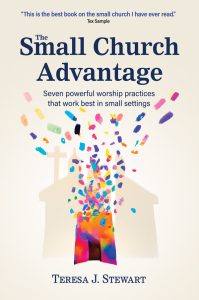Brandon O’Brien is senior director of global thought leadership at Redeemer City to City, where he oversees the development of resources for urban church planters and pastors worldwide. His latest book is the revised edition of The Strategically Small Church: Intimate, Nimble, Authentic and Effective (Baker Academic).
There are some days I would like to retire the term “small church” altogether. For one, there’s no consensus definition for “small.” We can all agree that a church of 20 is small. But where does small stop? At 100? 200?
Similarly, there is no single “small church experience.” Small churches are found in all types of communities, and the social challenges and opportunities in each place vary significantly. Some churches are small because they are new, and they will get bigger. Others are small today but once were large. Demographics and their attendant pastoral challenges will be quite different in each case.
Perhaps the biggest issue with the term “small church” is that it promotes a misconception about what size church is “normal.” It’s tempting to interpret small church to mean something like smaller than average. Tempting—but wrong.
Today almost 70% of America’s churches have fewer than 100 participants in regular attendance. Fewer than 10% have more than 250. That means that “small” is average, typical, normal. Rather than being a subcategory of American ministry, the small church is the norm. If you take a longer and broader view, most churches throughout history and in most parts of the world are and always have been small.
Which is to say that small churches are perfectly normal churches. And while I’m not a prophet or a futurist, I suspect smaller churches will become even more normal in the next generation.
Pastors and congregations alike, in my experience, have a very different impression of reality. Small churches operate in the shadows cast by statistically fewer but vastly more influential large churches. The normative vision for church ministry and success is determined by the overwhelming minority of practitioners. As a result, when pastors and congregations fail to achieve ministry success as it is defined by unusually large churches, they can experience profound spiritual shame. What a terrible burden.
Fortunately, there is a robust body of literature developed by people who are convinced, like I am, not only that there is nothing wrong with small churches but that every congregation has everything it needs to do the work God has called it to do. The following selection of books belong in that category.
Some are more theological, some more contemplative, others more practical or tactical. Each is written by practitioners—people who have actually done the work and love the work. All of them are warm in tone, highly readable and immensely helpful.
 Preaching and Worship in the Small Church by William H. Willimon and Robert L. Wilson (Wipf and Stock) does two things helpfully: It shows just how long-held our nationwide embarrassment about small churches is and reminds us that the
Preaching and Worship in the Small Church by William H. Willimon and Robert L. Wilson (Wipf and Stock) does two things helpfully: It shows just how long-held our nationwide embarrassment about small churches is and reminds us that the
 The Pastor: A Memoir by Eugene H. Peterson (HarperOne) is a moving reflection on ministry and pastoral calling from someone who was never seduced by the upsizing of church. He’s the sort of pastor many of us would be happy to emulate.
The Pastor: A Memoir by Eugene H. Peterson (HarperOne) is a moving reflection on ministry and pastoral calling from someone who was never seduced by the upsizing of church. He’s the sort of pastor many of us would be happy to emulate.
 De-Sizing the Church: How Church Growth Became a Science, Then an Obsession, and What’s Next by Karl Vaters (Moody Publishers) offers a historical survey of how size became a primary metric for ministry success and suggests better ways to evaluate the health and effectiveness of religious work.
De-Sizing the Church: How Church Growth Became a Science, Then an Obsession, and What’s Next by Karl Vaters (Moody Publishers) offers a historical survey of how size became a primary metric for ministry success and suggests better ways to evaluate the health and effectiveness of religious work.
 Shepherding the Small Church: A Leadership Guide for the Majority of Today’s Churches, 2nd Ed. by Glenn C. Daman (Kregel) is a comprehensive guidebook for developing the theology, character, mission and vision of a local church.
Shepherding the Small Church: A Leadership Guide for the Majority of Today’s Churches, 2nd Ed. by Glenn C. Daman (Kregel) is a comprehensive guidebook for developing the theology, character, mission and vision of a local church.
 The Small Church Advantage: Seven Powerful Worship Practices That Work Best in Small Settings by Teresa J. Stewart (Market Square Publishing) celebrates and offers practical guidance about uniquely formative worship in small churches.
The Small Church Advantage: Seven Powerful Worship Practices That Work Best in Small Settings by Teresa J. Stewart (Market Square Publishing) celebrates and offers practical guidance about uniquely formative worship in small churches.
 Pastoral Care in the Small Membership Church by James L. Killen Jr. (Abingdon Press) offers winsome and practical advice on deeply personal aspects of pastoral ministry, such as home visits, dealing with crises and conflict, and making conversation.
Pastoral Care in the Small Membership Church by James L. Killen Jr. (Abingdon Press) offers winsome and practical advice on deeply personal aspects of pastoral ministry, such as home visits, dealing with crises and conflict, and making conversation.
 Imagining the Small Church: Celebrating a Simpler Path by Steve Willis (Rowman & Littlefield Publishers) is a philosophical reflection on ways serving a small church is both a cross-cultural and countercultural experience today.
Imagining the Small Church: Celebrating a Simpler Path by Steve Willis (Rowman & Littlefield Publishers) is a philosophical reflection on ways serving a small church is both a cross-cultural and countercultural experience today.

